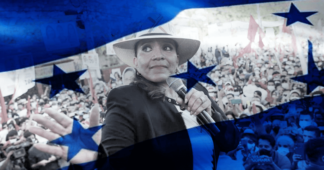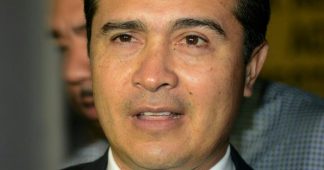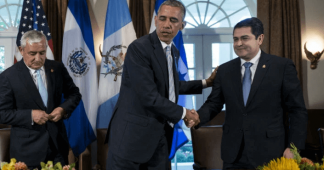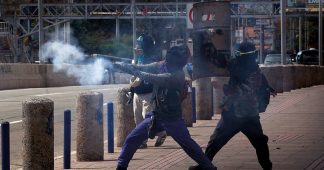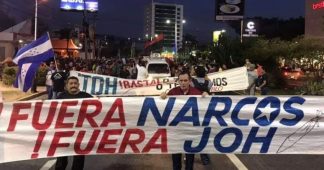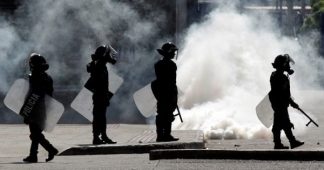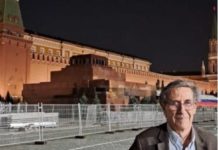By Fernando Esteche*
Dec 13, 2021
In 2009, a coup of a new kind was carried out in Honduras in order to disrupt the possibility of Honduras’ strategic alliance with Bolivarian Venezuela through ALBA. The coup by Joe Biden and Hilary Clinton, then vice-president and secretary of state of President Barack Obama, was undisguised.
Months after the coup, a mock general election was held to legitimize the coup regime, putting Porfirio Lobo of the National Party as president.
But the real power, the material and intellectual instigators of the construction of the narco-state in Honduras, are the National Party’s national deputies Juan Antonio and Juan Orlando Hernández.
The Hernández drug gang has been monitored by the DEA since before 2006. But of course, they let them do what they wanted as long as they serve their own interests. And the narco-state that was necessary years ago is now becoming a nuisance.
The coup, the dismantling of institutions and the rupture of the so-called Honduran social contract, were undertaken in order to consolidate the narco-state, which is now in full retreat.
The hard data is eloquent; almost 60% of the GDP in foreign debt, extreme poverty is rampant among 75% of the population, and the massive exodus of its population is resulting in an unprecedented migratory crisis, displaced people fleeing extreme poverty and endemic violence, with Dantesque levels of senseless massacres.
As Professor Hassaan Fariñas points out, “the Hernández brothers stood at the top of a political/criminal structure of pure cruelty, greed and inhumanity, which transformed the country of Morazán into a real nightmare for all Hondurans, except for the owners of big capital and the owners of the state”.
Xiomara Castro’s victory is clearly a popular democratic victory, which oxygenates the country’s violent and oppressive political system after a long decade of patient resistance.
Although the concept of “democratic victory” remains polysemic, it is undoubtedly a popular victory, but given the circumstances of the region and the powerful offensive redeployment of the Americans, there is surely little that can be expected as a gesture of anti-imperialist autonomy from the new government, which describes itself as social democratic. It is a possibility of a government that is born conditioned.
It does not necessarily mean that the US has lost here. On the contrary, this period will give them the breathing space to try to prevent the continuation of the massive flow of migrants. The narco-state was a nuisance for the Biden administration itself, to the point that it prosecuted Hernández gang officials for drug trafficking days before the elections, including the outgoing president and vice-president.
Xiomara Castro’s alliance with Salvador Nasralla’s party gives her enough room for manoeuvre to readjust the institutional framework that has been completely penetrated by the Hernández gang. The National Party, as the organic expression of the Honduran conservative right, has also been weakened and left ineffective after the flight of its leaders in search of impunity. The same is true of the Liberal Party, the expression of the liberal right, which has had a dismal electoral performance. This foreshadows the enormous possibility of a reconfiguration of the party system in Honduras in keeping with the new times.
The legislative edifice of formidable exceptions that allowed the super-exploitation of the labour force and the common goods of the Honduran people and facilitated looting should not be difficult to dismantle. What the incoming government will not be able to easily dismantle is the fragility of a rachitised economy, invaded by a sort of maquilas, with the special economic development zones; and dependent on remittances sent by residents in the United States, which constitute the true lungs of the Honduran economy as well as its main weakness.
The US bases installed on Honduran territory are the beachhead for the policy of attrition against Sandinista Nicaragua, and the reassurance of containment of an eventual leftist resurgence in El Salvador. From the recognition of Jerusalem as the capital of Israel to the preferential trade deal with Taiwan, all genuflecting before the Empire, which has nothing to do with the Central American country’s own strength-building needs, the entire foreign policy will merit an overhaul.
The winning political alliance is complex and motley, far from being a revolutionary anti-imperialist structure. It also faces an urgent need for financial and political oxygenation to combat endemic violence, structural poverty, and rebuild the economy. The United States knows this and is ready to maintain its interests in the region, but it is clear that the world has changed, and other actors can help the country if its leadership has the capacity and strength to throw off the historical colonial shackles; the coming times will tell us how to evaluate what is happening these days.
On the regional map, Nicaragua and Venezuela reaffirm the need for a revolutionary foreign policy and a bold policy of international alliances to resolve and attack internal stagnation and problems. Honduras cannot say that it does not have an organised people because it has and that is why it won the elections; what it cannot define is the ideological political nature of the political leadership.
*Fernando Esteche has a PhD in Social Communication (UNLP). He is full Professor of International Relations (FPyCS – UNLP), Professor of Contemporary History of Latin America (FPyCS – UNLP) and director of PIA Noticias.
Published at uwidata.com
We remind our readers that publication of articles on our site does not mean that we agree with what is written. Our policy is to publish anything which we consider of interest, so as to assist our readers in forming their opinions. Sometimes we even publish articles with which we totally disagree, since we believe it is important for our readers to be informed on as wide a spectrum of views as possible.
